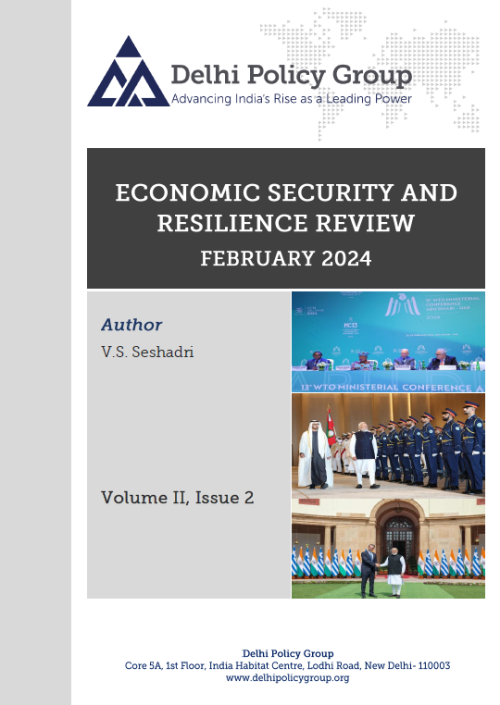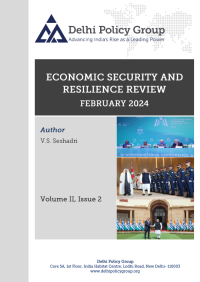Economic Security and Resilience Review
Date: March 05, 2024
This month’s ESRR highlights two recent studies on global economic and trade fragmentation trends, one by the Mckinsey Global Institute and the other by the WTO. The former projects two possible scenarios by 2035, one of fragmentation and the other of diversification. The WTO report affirms that a fragmenting trading world would not provide increased security or development and ventures to suggest a path of ‘reglobalisation’ that will better advance the world’s interests and concerns. The author then provides his own assessment of the two reports.
This issue outlines the very limited progress made at the WTO ministerial meeting held in Abu Dhabi in late February. Several of the pending issues have been tossed forward for convergences to emerge in the future. While expectations from the meeting were in any case modest, inability to put together a meaningful package of agreements at a time of global uncertainty on trade issues reflects the widening gulf in the positions and interests of the major players.
This ESSR then draws attention to the prominence given to the India-Middle East-Europe Economic Corridor (IMEEC) initiative, both during PM Modi’s visit to the UAE and during the incoming visit of the Greek PM Kyriakos Mitsotakis. PM Mitsotakis devoted a good part of his inaugural address at this year’s Raisina Dialogue to IMEEC. The UAE visit of PM Modi also witnessed the signing of a bilateral investment treaty and long term LNG supply agreements, signalling India’s expanding economic ties with the Gulf nation.
Among the economic security defense measures taken during the month, prominent were the probe ordered by President Biden into national security risks from import of internet connected vehicles from countries of concern, including China, and a anti-subsidy probe launched by the EU on Chinese train maker CRRC in the context of a bid submitted by it for a Bulgarian public procurement contract for an electric train project.
Finally, for the first time an Indian company, Bengaluru based Si2 Microsystems, has been included in the latest package of economic sanctions announced by the EU aimed at stopping trade in certain electronic components with Russia.
These and certain other developments covered in this month’s ESRR can be viewed at ESRR, Vol. II, Issue 2. To read this ESRR, Vol. II, Issue 2, please see the PDF attached.
This issue outlines the very limited progress made at the WTO ministerial meeting held in Abu Dhabi in late February. Several of the pending issues have been tossed forward for convergences to emerge in the future. While expectations from the meeting were in any case modest, inability to put together a meaningful package of agreements at a time of global uncertainty on trade issues reflects the widening gulf in the positions and interests of the major players.
This ESSR then draws attention to the prominence given to the India-Middle East-Europe Economic Corridor (IMEEC) initiative, both during PM Modi’s visit to the UAE and during the incoming visit of the Greek PM Kyriakos Mitsotakis. PM Mitsotakis devoted a good part of his inaugural address at this year’s Raisina Dialogue to IMEEC. The UAE visit of PM Modi also witnessed the signing of a bilateral investment treaty and long term LNG supply agreements, signalling India’s expanding economic ties with the Gulf nation.
Among the economic security defense measures taken during the month, prominent were the probe ordered by President Biden into national security risks from import of internet connected vehicles from countries of concern, including China, and a anti-subsidy probe launched by the EU on Chinese train maker CRRC in the context of a bid submitted by it for a Bulgarian public procurement contract for an electric train project.
Finally, for the first time an Indian company, Bengaluru based Si2 Microsystems, has been included in the latest package of economic sanctions announced by the EU aimed at stopping trade in certain electronic components with Russia.
These and certain other developments covered in this month’s ESRR can be viewed at ESRR, Vol. II, Issue 2. To read this ESRR, Vol. II, Issue 2, please see the PDF attached.



